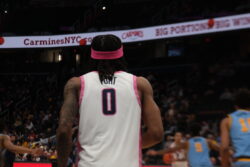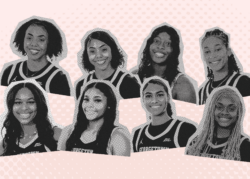As of this past Tuesday, last year’s National Defensive Player of the Year, LSU star cornerback Tyrann “Honey Badger” Mathieu, returned to the school to enroll in classes for this fall. Back in early August, Mathieu had been dismissed from the team by Head Coach Les Miles for repeatedly testing positive for marijuana. Mathieu had been at a Houston drug rehabilitation center since Aug. 14, and has received guidance from former NBA player John Lucas, who himself had a long history with drug use. At one point, it was rumored that Mathieu would possibly transfer to a school in the FCS, such as McNeese State or Nicholls State, both of which he visited and at which he would have been immediately eligible to play. Instead, the former Heisman Trophy candidate decided to wait the year out at LSU, in hopes that he would be reinstated and allowed to play football next season.
The obvious short-term move for Mathieu would have been to go to the school where he could play football immediately, without waiting for his suspension to end, and prepare for the 2013 NFL Draft. The only way Mathieu could have accomplished both of those goals was by transferring to an FCS school. Instead, Mathieu chose to stay at LSU.
This is surprising for two reasons. First, most college athletes have short time horizons. College students tend to mostly worry about the here-and-now instead of the effects their decisions will have on their future careers. We’re the leaders of the procrastination world, worrying more about having fun now as opposed to what the consequences of having fun will be further down the road (like going out for a night at the Tombs instead of starting on that 15-page paper due in two days that you haven’t touched yet). Mathieu is making a big sacrifice in passing up the opportunity to enter next year’s NFL Draft, and will most likely have to wait until at least two years from now until he can start making the big bucks.
The move is also surprising because, being a competitive athlete, Mathieu would prefer not to go an entire year without playing football. Superstar athletes tend to be programmed to do one thing, and that’s to play their sport. With regards to his physical development as an athlete, it’s hard to say whether Mathieu is making the right decision to improve his game in anticipation for an eventual NFL career.
On a moral front, however, the benefits of Mathieu’s decision are clear. By owning up to his mistakes, and sticking with the program that first scouted him, Mathieu is demonstrating his maturity, loyalty, and humility–qualities that any prospective NFL team will respect.
However, Mathieu may not be able to maintain his level of play in his prolonged time off. If he returns to LSU and has an unproductive year, it could be tough for him to get picked early in the Draft. It is important to keep in mind that Mathieu, historically, is a player who goes with his instincts. He has a nose for the ball and a penchant for the big play–elements a player never loses, even if they haven’t played competitively in over a year. Mathieu also has two years of eligibility left, and would likely be able to learn and improve a lot more on a top team like LSU as opposed to a second-tier FCS team.
Premier college athletes tend to think in terms of “What’s the fastest way I can get to the pros?”, and that, at times, can lead them to putting their own self-interests in front of the interests of their schools. That’s not necessarily a bad thing. College athletes are unpaid, and, at least in football, generate massive revenue for their institutions. Therefore, it’s not unreasonable for athletes to do what’s best for their own career prospects.
In Mathieu’s case, his decision to stay with LSU is not sure to benefit his career in the long run. Still, one thing is for certain: It’s refreshing to see a college athlete realize all of the love that his university has given him despite his sometimes poor decision-making, and decide to repay that community by staying.






